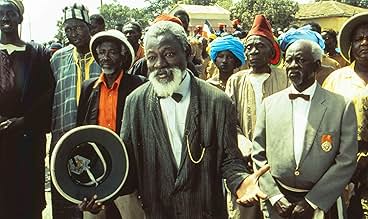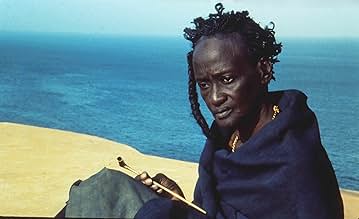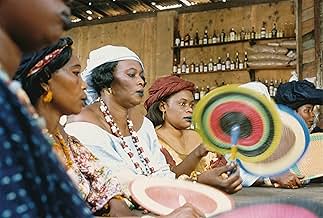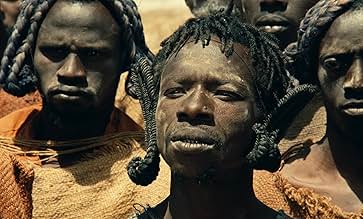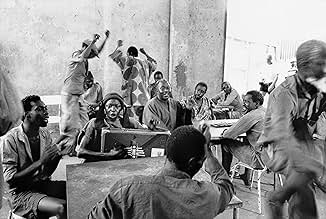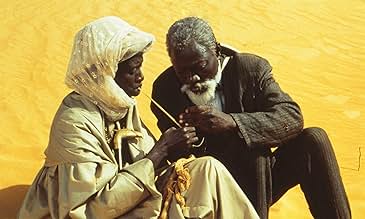IMDb रेटिंग
7.4/10
1.4 हज़ार
आपकी रेटिंग
अपनी भाषा में प्लॉट जोड़ेंDramaan is the most popular man in Colobane, but when a woman from his past, now exorbitantly wealthy, returns to the town, things begin to change.Dramaan is the most popular man in Colobane, but when a woman from his past, now exorbitantly wealthy, returns to the town, things begin to change.Dramaan is the most popular man in Colobane, but when a woman from his past, now exorbitantly wealthy, returns to the town, things begin to change.
- निर्देशक
- लेखक
- स्टार
- पुरस्कार
- 1 जीत और कुल 1 नामांकन
Omar Ba
- Le chef du protocole
- (as Omar Ba dit 'Baye Peul')
Issa Samb
- Le Professeur
- (as Issa Ramagelissa Samb)
Rama Thiaw
- La femme du Maire
- (as Rama Tiaw)
Abdoulaye Diop
- Le Médecin
- (as Abdoulaye Yama Diop)
Oumi Samb
- La danseuse
- (as Oumy Samb)
Tcheley Hanny
- Amazone
- (as Hanny Tchelley)
फ़ीचर्ड समीक्षाएं
Hyenes is a foreign film from Senegal adapted from a play, The Visit, by Swiss playwright Friedrich Dirrenmatt. It is spoken in the local language with English subtitles.
This film is surreal. It makes political statements and explains how a poor, failing village becomes prosperous by the greed of it's residents and the revenge of one of it's former community members.
Linguere Ramatou, played by Ami Diakhate, was once a young women who left her home village under less than honorable terms and has now become wealthy. She returns to her village to bestow a large sum of money so that the poor village can become a prosperous city. However, she seeks revenge upon her once seducer Dramaan, played by Mansour Diouf.
Dramaan had abandoned Ramatou when they were young forcing her to go to the city to engage in "the oldest profession." Now, Dramaan is an elder grocer granting good on credit to the unemployed villagers whom come to his store much to the displeasure of his wife and co-store keeper.
The villagers, learning that Ramatou is returning after many years to bestow money upon the village, appoints Dramaan the local mayor and instructs him to once again "woo" Ramatou so that she will make a large contribution to the village of Colobane.
What happens next is a surreal tale of how Dramaan fawns over his once love and her reactions to this lover from long ago.
The simple actions of Dramaan are often funny as well as the actions of the village's local officials. Ramatou is willing to provide the large endowment to the village on one condition. You need to see the movie to know that condition and how a "soul" is traded for the donation.
The village customs are interesting for Westerners whom may have little or no knowledge of some African customs. It is a little difficult to follow the fast movie English subtitles while listening to the dialogue in Senegalese. The film may need to be viewed more than once for the Westerner to fully comprehend the story and motivations of the principal players.
This film is surreal. It makes political statements and explains how a poor, failing village becomes prosperous by the greed of it's residents and the revenge of one of it's former community members.
Linguere Ramatou, played by Ami Diakhate, was once a young women who left her home village under less than honorable terms and has now become wealthy. She returns to her village to bestow a large sum of money so that the poor village can become a prosperous city. However, she seeks revenge upon her once seducer Dramaan, played by Mansour Diouf.
Dramaan had abandoned Ramatou when they were young forcing her to go to the city to engage in "the oldest profession." Now, Dramaan is an elder grocer granting good on credit to the unemployed villagers whom come to his store much to the displeasure of his wife and co-store keeper.
The villagers, learning that Ramatou is returning after many years to bestow money upon the village, appoints Dramaan the local mayor and instructs him to once again "woo" Ramatou so that she will make a large contribution to the village of Colobane.
What happens next is a surreal tale of how Dramaan fawns over his once love and her reactions to this lover from long ago.
The simple actions of Dramaan are often funny as well as the actions of the village's local officials. Ramatou is willing to provide the large endowment to the village on one condition. You need to see the movie to know that condition and how a "soul" is traded for the donation.
The village customs are interesting for Westerners whom may have little or no knowledge of some African customs. It is a little difficult to follow the fast movie English subtitles while listening to the dialogue in Senegalese. The film may need to be viewed more than once for the Westerner to fully comprehend the story and motivations of the principal players.
Watched this 30 years after its creation and am very glad I did.
A short review : the way it seems I am should feel about Fellini, I feel about this film. I enjoy some Fellini films, but for whatever reason I felt more connected to this tale.
This film has plenty of spectacle. I mention fireworks, but a carnival in fact sprouts forth from the land (and the pursue of the dishonored woman returning to her home town).
There are both metaphoric and literal hyenas circling the town. The casting of Ami Diakhate was great and this the only film she ever made as far as I can tell. Feels like that might be a story in itself.
Just read an interview with the director (who died 7 years after this film from lung cancer, perhaps a colonial-induced cancer?) Anyways I think he was just a vibrant artist and able to guide dreams both as the director of the film and as a character within it. A master puppeteer never lets you see the strings.
That scene towards the end where Diakhate's character meets with her former lover/enemy/despoiler/mayor/public enemy is rather remarkable. From gazing out at the ocean together sharing an intimate smoke, to Diakhate descending into what looks like a tomb watching from afar as the mayor meets symbolic hyenas on the outskirts of town.
Such a smooth dream-like portrayal of a jarring event.
Next up for me "Touki Bouki"
A short review : the way it seems I am should feel about Fellini, I feel about this film. I enjoy some Fellini films, but for whatever reason I felt more connected to this tale.
This film has plenty of spectacle. I mention fireworks, but a carnival in fact sprouts forth from the land (and the pursue of the dishonored woman returning to her home town).
There are both metaphoric and literal hyenas circling the town. The casting of Ami Diakhate was great and this the only film she ever made as far as I can tell. Feels like that might be a story in itself.
Just read an interview with the director (who died 7 years after this film from lung cancer, perhaps a colonial-induced cancer?) Anyways I think he was just a vibrant artist and able to guide dreams both as the director of the film and as a character within it. A master puppeteer never lets you see the strings.
That scene towards the end where Diakhate's character meets with her former lover/enemy/despoiler/mayor/public enemy is rather remarkable. From gazing out at the ocean together sharing an intimate smoke, to Diakhate descending into what looks like a tomb watching from afar as the mayor meets symbolic hyenas on the outskirts of town.
Such a smooth dream-like portrayal of a jarring event.
Next up for me "Touki Bouki"
Hyenes, Mambety's avent-guard, surrealistic film captures the real heart and soul of the human social and economical blood thirst for money, when stopping to think about the different animal symbols in this film like the hyena, vulture, and yes even the monkey; you can't help feeling ashamed to be part of the big machine, we call progress. than again is that not what human nature, or the nature of animals is all about? Survival of the fittest. Mambety not only nails the human viciousness and easily influenced character on the head, but he slaps you in the face with our greed. A real plus to this movie is the musical language of Wolof. a must see movie and language, which cannot be matched.
Djibril Diop Mambéty's Hyenas doesn't quite jump the shark to the extent of Eugène Ionesco's Rhinoceros, a corrosive social satire which dramatizes the macro and micro fallibility of humankind by having people literally transform into the titular safari animal... but so searingly incisive is Mambéty's critique that you get the sense he's at least toyed with the idea. Adapting Swiss-German satirist Friedrich Dürrenmatt's play The Visit, Mambéty ups the stakes of the text's Sophie's choice scenario (is one man's life worth untold millions for a town fallen into ruin?) by setting it in rural Senegal, wherein the collective battle of moralism and pride against a paradigm shift of wealth is amplified to poignant and sobering heights. As such, Hyenas serves to both savagely lambast the corrosive legacy of colonialism in a recently independent Senegal, while equally shedding the spotlight of judgment on the role of virtue in a capitalist society - an experience which generally proves equally squirmy for the average viewer, as for the characters onscreen. Hyenas is billed as a dark comedy, but, apart from trace elements of allegorical magic realism (we never find out exactly how an exiled, former teenage prostitute has become "richer than the world's bank"), there's only the bleakest, most mirthless of incredulous guffaws to be found therein. Instead, Mambéty wrings out every last drop of uncomfortable empathy in depicting a poor but proud people steadily succumbing to materialistic, murderous mob mentality* - a scenario that starts absurd, but quickly becomes far too familiar. Mambéty's witty screenplay deftly unspools each wrinkle of collective corruption, from the nattily dressed mayor bemoaning the degraded state of his town, oblivious to the rag-wearing homeless man bemusedly building a fire immediately behind him, to the townspeople vocally expressing their outrage ("She thinks we're Americans who would kill each other for nothing!") while blatantly strutting around wearing their bribes, practically collectively willing the murder into a fatalistic eventuality. As the situation escalates, Mambéty lets the poignancy of the joke fester. Things may start with comparative levity, (Mambéty turns each townsperson lobbying for new refrigerators and air conditioners into a sordid, Oprah-esque gameshow), but it isn't long before the initial paradoxical joviality decays into a literal torch-bearing mob (the town gaslighting their 'walking dead' peer by barring him entrance to a train leaving town while wishing him a good trip is genuinely hard to watch), before culminating in a dirge of chanting, shuffling zombies. Though Hyenas is, for the most part, a slow, sombre, methodical film, Mambéty lends it a larger-than-life aesthetic grandeur. His cinematography employs a high saturation rate, with the vibrancy of colours (glaring, aggressive reds, and the encroaching, corrupting sheen of gold) popping against the beige of (gorgeously shot) sweeping expanses of desert perfectly encapsulating the intoxicating allure of colonial socioeconomic transformation. Similarly, Wasis Diop's moody guitar score lends a thoughtful, eulogistic dignity to the slow, fatalistic social decay at play. While some of Mambéty's visual metaphors are a touch hit-and-miss (while having the townspeople slowly adapt hairstyles recalling hangman's nooses is a slick piece of visual trickery, his Modern Times-esq consistent cross-cutting between brewing mobs and a pack of snarling hyenas is a bit too on-the-nose), the consistent framing device of herds of local animals stirring uneasily (including a poor captive monkey at the film's central hub, who ends up becoming a disapproving Greek chorus unto itself) does lend the film an effectively disquieting restlessness. And as for the perplexing, sneaky ambiguity of the film's final shot? Mambéty is content to let the viewer stew, and draw their own conclusions. As the formerly "most popular man in Colobane" turned 'most likely to be assassinated,' Mansour Diouf anchors the film with an immaculately balanced performance that shifts from irreverent goofiness, to exasperated histrionics, before finishing with a quieter, sadder dignity. He carefully toes the line of remaining sympathetic without ever becoming too likeable throughout, instead wearing his flawed humanity on his sleeve with a gentle, sad, side-smile. As the imposingly wealthy homecoming Linguère Ramatou, Ami Diakhate steals the show with a formidable, commanding presence. In less capable hands, Ramatou, with her devious master plan and golden artificial limbs, would play like a Bond villain - but Diakhate ensures that Ramatou's vitriol is grounded in a lifetime of real, radiating hurt, which Diakhate rawly embodies with consummate class. Faly Gueye consistently steals scenes with an icy deadpan humour as Diouf's perennially unimpressed wife, while Mahourédia Gueye pompously postures like the best of them as the town's blustery mayor.
Fuelled with the timeless wisdom of a Classical Greek tragedy, yet coursing with the contemporary, acrid urgency of an itching postcolonial critique, Mambéty's Hyenas is a stirring, vibrant, and grimly entrancing watch. Although one can't help but with that Mambéty had dialled back the somewhat overblown visual symbolism a tad, and instead redirected that energy into a shade more of the tension-breaking humour just aching to surface, his film remains an unflinchingly striking watch. A cornerstone of contemporary African cinema, Hyenas is a timeless snarl at the overbearing fatalism of colonialism and capitalism - and, over 25 years on, it hasn't lost a whit of potency or relevance.
-8.5/10
*How's THAT for alliteration?
Fuelled with the timeless wisdom of a Classical Greek tragedy, yet coursing with the contemporary, acrid urgency of an itching postcolonial critique, Mambéty's Hyenas is a stirring, vibrant, and grimly entrancing watch. Although one can't help but with that Mambéty had dialled back the somewhat overblown visual symbolism a tad, and instead redirected that energy into a shade more of the tension-breaking humour just aching to surface, his film remains an unflinchingly striking watch. A cornerstone of contemporary African cinema, Hyenas is a timeless snarl at the overbearing fatalism of colonialism and capitalism - and, over 25 years on, it hasn't lost a whit of potency or relevance.
-8.5/10
*How's THAT for alliteration?
A stunning adaptation of Friedrich Durrenmatt's coldly brilliant play, The Visit, HYENES (hyenas) actually improves on the story by transposing the action to a Senegalese village. A fabulously wealthy old woman, who was born in the village but run out in disgrace as pregnant youth, returns and promises the villagers a fortune on one condition: that they kill the man who ruined her, an aged man who is the town's popular, good-natured grocer.
By moving the story from Durrenmatt's European setting to a dirt-poor African village, all the tensions are heightened, and the director Mambety sets the huge issues in high relief against the desert backdrop: justice, betrayal, revenge, guilt, greed (or need?), loyalty, and charity are played out in a searing (and searingly beautiful) desert, filmed with the grace of Bergman and written with the wryness of Bunuel. There are no good guys. It's up to you if there are bad guys. Everyone is a predator.
By moving the story from Durrenmatt's European setting to a dirt-poor African village, all the tensions are heightened, and the director Mambety sets the huge issues in high relief against the desert backdrop: justice, betrayal, revenge, guilt, greed (or need?), loyalty, and charity are played out in a searing (and searingly beautiful) desert, filmed with the grace of Bergman and written with the wryness of Bunuel. There are no good guys. It's up to you if there are bad guys. Everyone is a predator.
क्या आपको पता है
- ट्रिवियाRestored over the course of 2017 by Eclair Digital in Vanves, France. The restoration was taken on by Thelma Film AG.
- कनेक्शनFeatured in The Story of Film: An Odyssey: Movies to Change the World (2011)
टॉप पसंद
रेटिंग देने के लिए साइन-इन करें और वैयक्तिकृत सुझावों के लिए वॉचलिस्ट करें
- How long is Hyenas?Alexa द्वारा संचालित
विवरण
बॉक्स ऑफ़िस
- US और कनाडा में सकल
- $24,672
- दुनिया भर में सकल
- $24,672
इस पेज में योगदान दें
किसी बदलाव का सुझाव दें या अनुपलब्ध कॉन्टेंट जोड़ें



